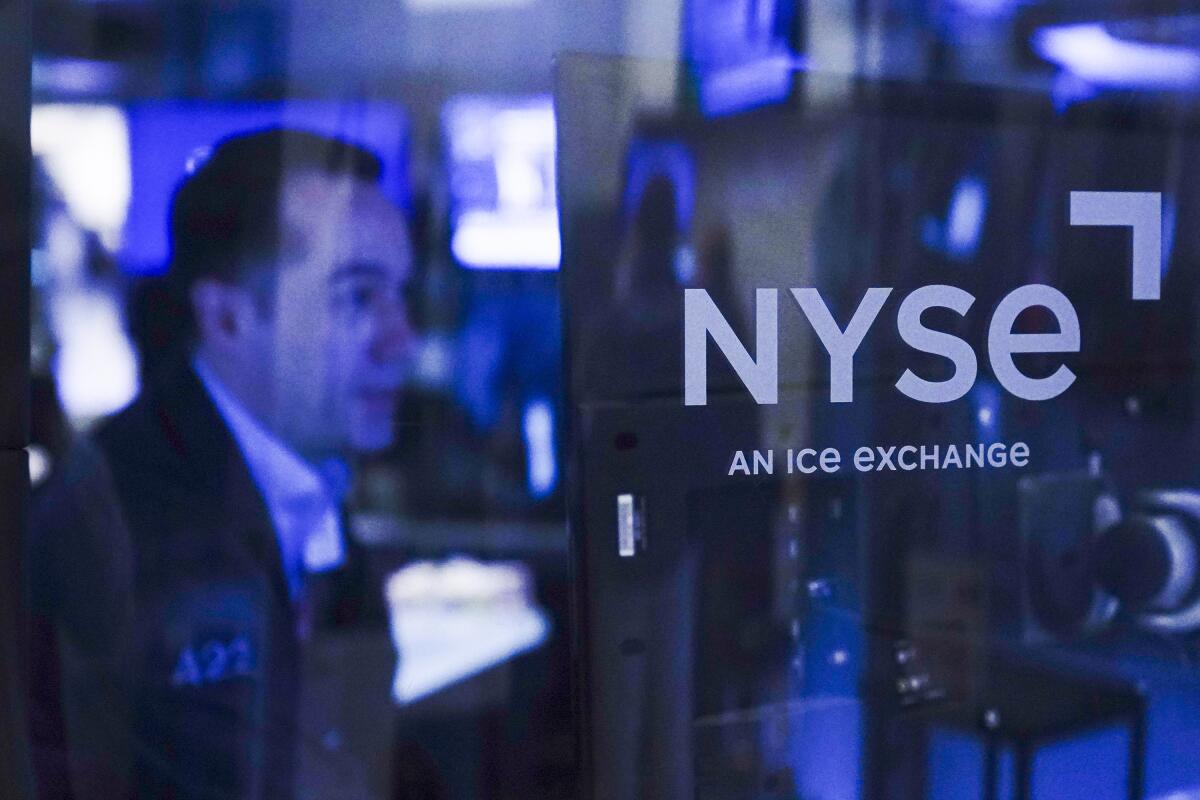Wall Street holds steady ahead of a potentially big week

- Share via
Stocks were mixed in quiet trading Monday as Wall Street stays in a holding pattern ahead of a potentially big week.
The Standard & Poor’s 500 rose 2.78 points, or 0.1%, to 4,048.42 after coming off its first winning week in the last four. The Dow Jones industrial average gained 40.47 points, or 0.1%, to close at 33,431.44. The Nasdaq composite slipped 13.27 points, or 0.1%, to 11,675.74.
The stock market has found some footing over the last week after a roller-coaster start to the year, with a swift rise giving way to a sharp tumble. At the center of it all has been high inflation and expectations for what the Federal Reserve will do about it.
Early in the year, stocks rallied and bond yields eased as hopes rose that cooling inflation would prompt the Fed to take it easier on its interest rate increases. Then, stronger-than-expected reports on the economy raised worries that inflation is not cooling as quickly and smoothly as hoped.
Although that calmed worries about an imminent recession, it also forced Wall Street to raise its forecasts for how high the Fed will take interest rates. Higher rates can drive down inflation, but they also hurt prices for stocks and other investments and can create a recession in the future.
On Monday, Treasury yields eased to take some pressure off the stock market. The yield on the 10-year Treasury fell to 3.93% after topping 4% last week and reaching its highest level since November. It helps set rates for mortgages and other loans that are central to the economy’s strength.
A run of strong economic data and signs that inflation remains stubbornly high could lead the Federal Reserve to raise its benchmark rate higher in the coming months than it has previously forecast, several Fed officials say.
On Wall Street, technology stocks were some of the market’s strongest. They tend to be some of the biggest beneficiaries of lower interest rates, which can boost demand by investors for high-growth companies.
Apple rose 1.9% and Microsoft ticked up 0.6% to be the two biggest forces lifting the S&P 500.
On the losing end was Tesla, which fell 2%. Over the weekend, it cut the prices of two of its most expensive vehicles.
Bigger action may be ahead this week, with several potentially market-moving events on the calendar.
Fed Chair Jerome H. Powell will testify before Congress for two days, beginning Tuesday. Other Fed officials’ comments recently have led to big swings in markets, as traders try to get ahead of the next moves by the Fed.
A majority of the nation’s business economists expect a U.S. recession to begin later this year than they had previously forecast, after a series of reports have pointed to a surprisingly resilient economy despite steadily higher interest rates.
Brian Jacobsen, senior investment strategist at Allspring Global Investments, isn’t expecting anything surprising from the testimony. That’s partly because an important data release is scheduled for Friday, one that could by itself cause a big swing in the Fed’s thinking.
That’s when the government will release its latest monthly jobs report. If the reading is stronger than expected, particularly if it shows a big gain in wages, it could shake Wall Street and force it to raise rate expectations even higher.
The Fed has been trying to cool growth in wages to remove pressure on inflation, which remains far above its 2% annual target, and blowout figures could cause it to get more aggressive about rates.
The Fed’s next move on rates will arrive later this month. Besides Friday’s jobs report, upcoming releases on inflation across the economy will probably also carry a lot of weight on the decision.
The Fed has pulled its key overnight rate to a range of 4.50% to 4.75%, up from virtually zero at the start of last year, in its fastest set of rate hikes in decades. Last month, it dialed down the size of its increases and highlighted progress being made in the battle to get inflation lower.
But that was before last month’s string of hotter-than-expected data on inflation and other measures of the economy. Wall Street now is bracing for at least three more increases and the possibility the Fed could also ratchet the size of them back up.
“My view is I don’t think they need to hike anymore,” said Jacobsen, who sees last month’s strong economic data as more a bump in the road for the downward trend of inflation than a shift in momentum.
“The real objective would be to try to hold at a cruising altitude for as long as possible. The higher they go, the sooner they will likely find they will want to cut rates.”
That’s because rate increases can take a long time to filter through the economy and have their full effects felt. Some parts of the economy, including housing and manufacturing, have already felt pain because of higher rates. The services side of the economy, meanwhile, is still cruising.
Jacobsen thinks the economy may be heading for a relatively short and shallow recession. But all the recent strength in the economy also has him thinking the economy may be in the midst of a rolling recession, in which some parts are weakening while other parts remain strong enough to keep the overall whole just outside a widespread downturn.
AP writers Elaine Kurtenbach and Matt Ott contributed to this report.
More to Read
Inside the business of entertainment
The Wide Shot brings you news, analysis and insights on everything from streaming wars to production — and what it all means for the future.
You may occasionally receive promotional content from the Los Angeles Times.












